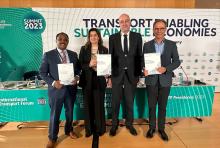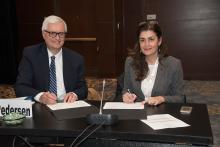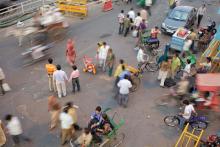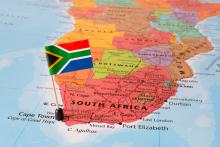Led by the World Bank, the SuM4All is a multi-stakeholder partnership that aims to reshape the global mobility agenda through advocacy, action, and financing. SuM4All brings together a diverse and high-level group of stakeholders which includes: Multilateral Developments Banks, United Nations Agencies, Programs, and Regional Commissions, and Bilateral donor organisations.
Susanna Zammataro, IRF executive director, signed the charter with Laura Tuck, vice president of Sustainable Development for the World Bank at a ceremony held at the World Bank headquarters in Washington DC on 11th January 2018.
"After the release of the Global Mobility Report to which IRF Geneva has provided input for the Safety and Efficiency chapters, we are now working with the other members of the consortium on the further development and implementation of a Global Tracking Framework, a new data platform to help track global progress towards sustainable mobility" said Zammataro.
Speaking at the ceremony, Tuck underlined that, "Sustainable Mobility for All brings together a diverse and influential group of transport stakeholders, with a commitment to speak with one global voice and act collectively to implement the Sustainable Development Goals (SDGs) and transform the transport sector. We stand for a mobility of goods and people that is equitable, efficient, safe and green."
At the Climate Action Summit 2016, the World Bank Group president Jim Yong Kim called for action to accelerate efforts to unify and transform the transport sector. He proposed to develop, with interested transport stakeholders, a new and strategic global initiative that will support the implementation of the SDGs and transform the sector. This announcement was welcomed by the former Secretary General of the United Nations, Ban Ki Moon. Out of this call for action, Sustainable Mobility for All™ was born. In January 2017, the initiative was formally established during its first Consortium Meeting in Washington DC, with a workplan and an interim governance arrangement.
Sum4All stands for a mobility of goods and people that is equitable, by ensuring that transport is connecting people and communities to jobs, schools and health care and in the delivery of goods and services to rural and urban areas. In this way it can provide all with equal opportunities, leaving no one behind. It is also efficient, ensuring that the increased demand for mobility is met at the least possible cost for society. This includes road, rail, maritime, ferry and air transport, as well as non-motorised transport, such as cycling and walking. It prioritises safety, by reducing crashes, injuries, and fatalities from transportation mishaps across all modes of transport. And it is green, through lowering the environmental footprint of the transport sector to combat climate change and pollution. Sum4All aims at reshaping the mobility agenda using advocacy, for greater coherence in international, national, and local transport policies and investments. More coherence means more predictability - a key factor
to attract private investments and make real changes happen. It also targets actions, promoting policy reforms and investments that will achieve a mobility pattern that is sustainable. And it intends to lay out a roadmap of actions for the international community to consider in order to achieve the goals of universal access, efficiency, safety and green mobility. Through financing it can help deliver the “right” mobility. Sum4All and its partners will work towards increasing and directing financing to achieve the four global objectives. The Global Mobility Report - the first output produced by SuM4All - is the first ever assessment of the transport sector. The Global Mobility Report covers all transport modes. It tracks progress towards sustainable mobility around the world in four areas: universal access, efficiency, safety and green mobility. To measure progress, the report proposes a Global Tracking Framework (GTF) that covers existing targets and relevant transport-related indicators, including those already identified as part of the Sustainable Development Goals (SDGs).
According to the Global Mobility Report, unless action is taken by all transport stakeholders, the costs for increased mobility in terms of social exclusion, accidents, inefficiencies, and pollution are simply too high. For the first time, a report pulls together the global evidence and data, looking at the sector comprehensively and measuring the extent to which investments and policies go in the right direction.
IRF Geneva strengthens partnership with World Bank on SuM4All Initiative
With the signing of the Consortium Charter in Washington DC last January, IRF Geneva has formalised its involvement in the Sustainable Mobility for All Initiative (SuM4All)
Led by the World Bank, the SuM4All is a multi-stakeholder partnership that aims to reshape the global mobility agenda through advocacy, action, and financing. SuM4All brings together a diverse and high-level group of stakeholders which includes: Multilateral Developments Banks, United Nations Agencies, Programs, and Regional Commissio
With the signing of the Consortium Charter in Washington DC last January, IRF Geneva has formalised its involvement in the Sustainable Mobility for All Initiative (SuM4All)
With the signing of the Consortium Charter in Washington DC last January, 1201 IRF Geneva has formalised its involvement in the Sustainable Mobility for All Initiative (SuM4All)









